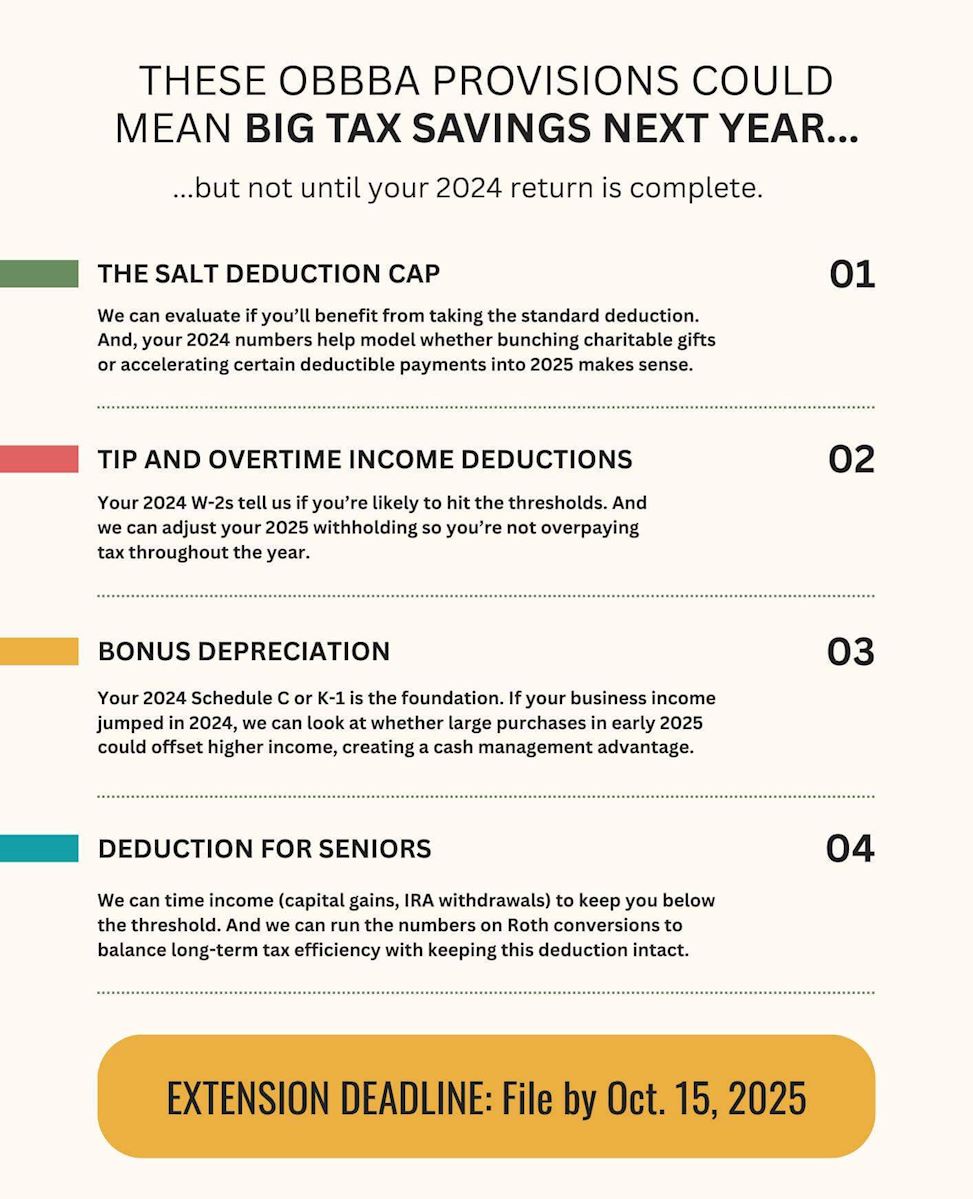“No plan ever failed due to good planning.” —Jury Nel
Quick Answers: What’s the Last Day to File Taxes on Extension?
- October 15, 2025, is the last day to file your 2024 federal return if you filed an extension back in April.
- If you still owe, penalties and interest are already accruing. Filing now doesn’t erase them, but it stops more penalties from piling up.
- Your finalized 2024 return is a strategic blueprint for planning 2025 taxes under the One Big Beautiful Bill Act (OBBBA).
- Miss this deadline? You face a failure-to-file penalty of 5 percent per month (capped at 25 percent) plus a failure-to-pay penalty of 0.5 percent per month.
Did you file for an extension back in April, thinking, “I’ll deal with that later”?
Well, later has become now: October 15th is the last day to file taxes on extension for your 2024 return.
Which actually does two things at once:
- Closes the door on last year accurately and completely.
- Gives us a clear data set to start planning for next year.
Meaning: Your 2024 numbers are the necessary baseline for 2025 tax planning.
And while the OBBBA didn’t change what you owe for 2024, it did rewrite the playbook for 2025.
So, let’s break down the biggest OBBBA changes we can start planning for once you finish your 2024 tax filing:
The State and Local Taxes (SALT) Deduction Cap
Under OBBBA, the SALT deduction cap jumps from 10K to 40K. So, our big focus would be to evaluate if you’ll benefit from shifting strategy away from the standard deduction you’ve been taking.
For instance, if your 2024 return shows you paid 20K+ in state income and property taxes, suddenly itemizing becomes valuable again.
And, your 2024 numbers help us model whether bunching charitable gifts or accelerating certain deductible payments into 2025 makes sense.
Tip and Overtime Income Deductions
For 2025 forward, up to 25K of tip income and 12.5K (25K for joint filers) of overtime wages can be excluded from federal income tax.
Why does this matter?
- Your 2024 W-2s tell us if you’re likely to hit these thresholds.
- We can adjust your 2025 withholding so you’re not overpaying tax throughout the year.
Bonus Depreciation
If you have your own Milwaukee side business, this one is big: 100 percent bonus depreciation is now permanent starting January 19, 2025. That means you can write off the full cost of qualifying property (machinery, vehicles, equipment) in the year you buy it.
And your 2024 Schedule C or K-1 is the foundation. If your business income jumped in 2024, we can look at whether large purchases in early 2025 could offset higher income, creating a cash management advantage.
Deduction for Seniors
Starting in 2025, taxpayers aged 65+ get an additional 6K deduction stacked on existing age-based and standard deductions.
But the deduction phases out above 75K (single) / 150K (joint) MAGI. That’s why planning now is essential:
- We can time income (capital gains, IRA withdrawals) to keep you below the threshold.
- We can run the numbers on Roth conversions to balance long-term tax efficiency with keeping this deduction intact.

FAQ
“What happens if I miss the October 15 deadline?”
If you miss the last day to file taxes on extension, you face the failure-to-file penalty (5 percent per month) on any unpaid tax, with the failure-to-pay penalty (0.5 percent per month). The IRS does not grant extensions beyond October 15 for individual filers.
“Does filing late hurt my refund?”
If you’re due a refund, you won’t get hit with penalties. But you must claim it within 3 years (by April 15, 2028, for 2024 refunds).
“Can I still contribute to an IRA or HSA for 2024 if I file in October?”
No. Contribution deadlines for 2024 were April 15, 2025 (for most accounts). Filing for an extension doesn’t extend those.
“Should I itemize in 2025 if I never have before?”
Maybe. With the SALT cap quadrupling to 40K, high-tax-state filers who’ve defaulted to the standard deduction may benefit from itemizing.
“I’m retired. How does the new senior deduction help me?”
Starting in 2025, you’ll get an extra 6K on top of your standard and age-based deductions, provided your income stays under the phaseout thresholds. This could substantially lower your taxable income.
“Can I reduce my 2025 taxes with moves before the end of the year?”
Yes. Timing income, charitable contributions, equipment purchases, or retirement withdrawals before year-end 2025 can position you to maximize the new rules. That’s why October filing for your 2024 return matters now.
Why you should file now
As your Southeastern Wisconsin tax pro rooting for your success, my best word of advice?
Don’t wait until the last day to file taxes on extension to complete your 2024 return.
You’ll be adding unnecessary stress to the process. AND you’ll rob yourself of valuable time to set yourself up for strategic wins in 2025.
Planning now is how you maximize new deductions, income timing, withholding, the works. And my team and I are here to help with the process:
414-325-2040

